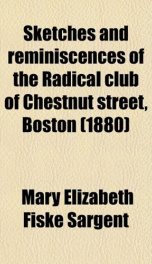sketches and reminiscences of the radical club of chestnut street boston

Purchase of this book includes free trial access to www.million-books.com where you can read more than a million books for free. This is an OCR edition with typos. Excerpt from book: III. DEMOCRACY. Br DAVID A. WASSON. MR. DAVID A. AVASSON, the essayist of the day, and one of New England's cleverest thinkers, read an elaborate paper upon the elements of true liberty. Believing in the "Scriptures of Polities," Mr. AVnsson handled his subject with the fastidiousness of a scholar and the sternness of a moralist. " In what sense is man free by nature?" he asked. "In reality, man is a victim to subjection, and it is only by the interposition of Art and Science that he breaks from his fetters. Co-operation is power ; and as physical subjection diminishes, a moral sense steps in. The universe is one vast system and celebration of obedience. Civilization restrains, and man has not perfect property in the blood of his own veins. It is not surprising, therefore, if there be shown a preference for the freedom antecedent to civilization ; and yet this same free life is a mirage. It fetters all man's human nature, and lets only the beast go free. Any freedom is fallacious, as it seems unconditional. " Every man has an affection for his own will, and a desire to make it effective," continued Mr. Wasson. "This may be called subjective liberty, and is good as an element, but not as a principle. Yet this constrains; for, multiply one will by many, and man is surrounded by a network of such constraints as are productive of humanity'strue emancipation. When two men come together there is a larger freedom, if they be rightly related ; there is a convergence of powers to a focus of right reason. Man is not born free, but is born to become so, and attains freedom by prophecy and aspiration. Politically, it is man's effective application of right reason to himself and others that makes him free. The serviceablencss of men depends upon their liberation in community; but l...
Info about the book
Author:
Series:
Unknown
ASIN:
B000MQ60O2
Rating:
3.5/5 (5)Your rating:
0/5
Languge:
English
Users who have this book
Users who want this book
What readers are saying
What do you think? Write your own comment on this book!
write a commentif you like sketches and reminiscences of the radical club of chestnut street boston try:
Other books by this author
Do you want to read a book that interests you? It’s EASY!
Create an account and send a request for reading to other users on the Webpage of the book!


